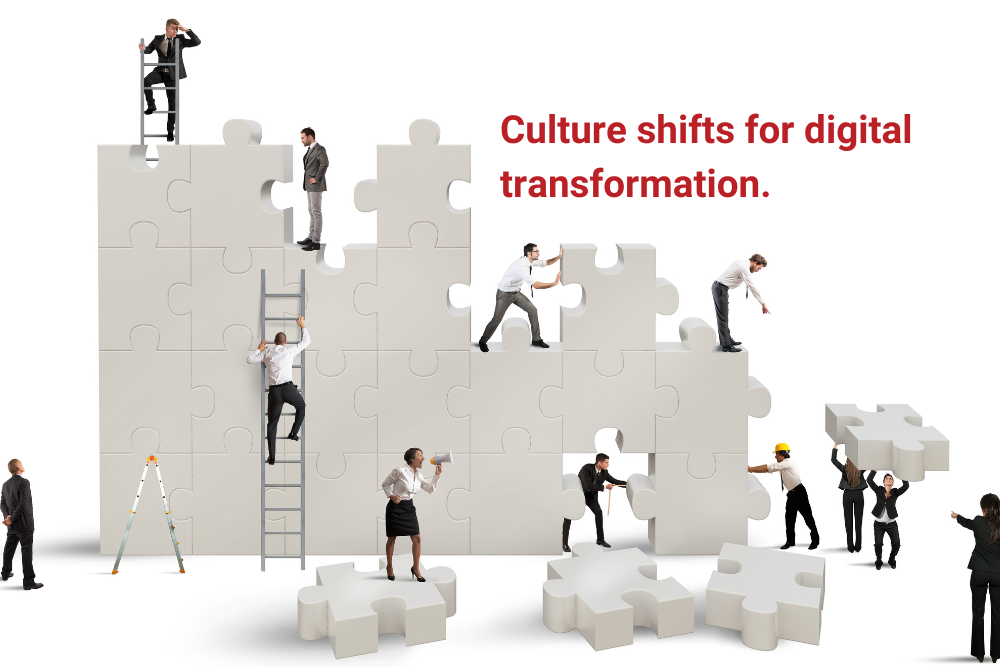Digital and Culture Shifts: The What and Who of Your Organisation’s Transformation and Ongoing Success.
In our recent blog, we talked about the 10 key things to consider when fine tuning your digital strategy. Today, we’d like to focus on the number two – people and technology; or, to be precise: ‘PEOPLE lead change. Not technologies (alone).’ Your leadership team and all your employees play key roles in your digital and culture shifts and these shifts have to be strategic and proactive.
“It’s so easy for digital transformation plans to focus on the technology: the roadmap of software purchases and development, the rollouts and implementations, the user trainings. But so many digital transformations manage to forget the humans… [becoming] a huge project about an internal buying group, deciding to purchase and install new technology, end of story.”
K. Hanratty & GR. Anderson, 2023 Source
We agree with Hanratty and Anderson in that if you are still in business, it is likely that you were subject to at least some digital transformation. While it’s a great start, it’s important to be honest about whether you simply spent the allocated budget and ticked a box, or things (processes and habits) in your company have actually changed since, and your people are actively driving your organisation forward.
Do your people understand all the benefits of the new technologies and how those fit into their every day work, as well as their personal and business objectives? Do they know how to use the technologies efficiently? What new insights are now available at their fingertips? How to access them? And so on.
It’s important to communicate to your team that in today’s work world “all of us are essentially tech companies but with different licences,” Anders Sorman-Nilsson (Thinque). “An engineering firm is a tech company with a licence for engineering, a university is a tech company with a licence for education, and so on.”
Now, seeing your organisation as a tech company (with a licence to educate), ask: do you have a clear vision and specific goals when it comes to developing your new digital identity? And does everyone in your organisation understand what role they play in achieving that?
No change comes without challenge, it’s always “scary at first and ugly in the middle”. According to an EDUCAUSE study, for example, the rate of adoption of new technologies among staff in the education industry, is generally lower that that among students (John O’Brien, THETA 2023). How do you address all the different needs to achieve desired results and stay ahead of the game? With declining enrolment rates around the world, this balance is becoming more and more critical no matter how challenging.
It is understandable that some companies simply have more resources available to them but be careful not to use this as an excuse. You can achieve sustainable results for your business through clever digital strategies. Embracing open source projects in at least some parts of your business and making sure you are constantly paying attention to your ongoing maintenance and infrastructure costs for example, can help you save costs, achieve efficiencies and deliver more outcomes. This will also leave you with more to invest in staff training and development or new services (or course) offerings.
Whether you are looking to improve your end user experience or your behind the scenes operations, you won’t do it without improving your digital competencies. Paying attention to macro-trends, ‘planning backwards’ from predicted future scenarios and keeping an open mind are all equally important ingredients if you want your team and your business to remain resilient and competitive.
Read: Digital competence: develop teaching skills for online learning.
Company leaders, team managers, educators or LMS administrators, we recommend you check out Hanratty and Anderson’s article – it addresses accountability of each of those stakeholder groups for the ‘vision, enablement and ability’ when it comes to making digital transformation a part of your culture. And if you are looking for ways to optimise your course, content or learning management systems, Catalyst team could help.
Coming up: ‘Moodle Analytics and Reporting: what you should be measuring to improve student success’ blog is coming soon. Sign up to our Newsletter not to miss out on new useful content from Catalyst.
Catalyst has been providing quality open source solutions, customised to our clients individual needs for over 20 years. We specialise in software development and IT Managed Services designed for enterprise level and growing organisations. All our hosting clients enjoy 24/7 Follow the Sun support and high availability, flexible and secure cloud infrastructure.
